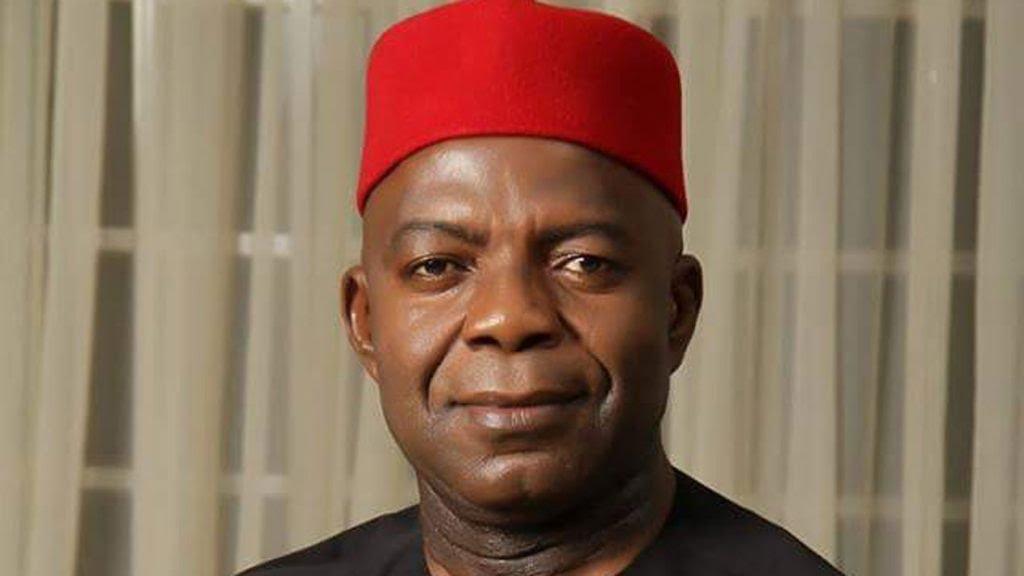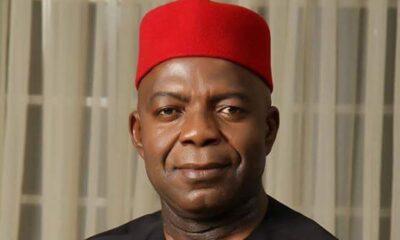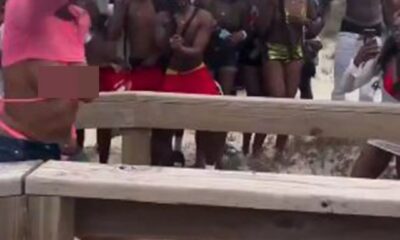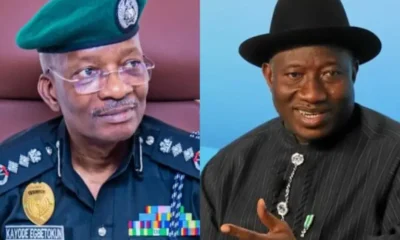News
Otti Suspends Transport Levies In Abia
Published
11 months agoon
By
Editor
The Abia State Governor, Alex Otti, has suspended all transport levies imposed on commercial drivers in the state.
This was contained in a statement by the special adviser to the governor on Media and Publicity, Ferdinand Ekeoma, on Wednesday.
He stated that the directive was in line with the campaign promise of the governor to sanitize methods of revenue collection in the state and stop all kinds of extortion, intimidation and harassement of motorists.
The statement read, “The governor has directed the immediate suspension of all kinds of transport levies payable to Abia state government and imposed on Tricycles (Keke), Buses, taxis and other commercial vehicles plying Abia roads.
“This suspension takes immediate effect, and will remain until government reviews these levies and makes public its arrangements for the smooth, organized and transparent collection of such transport levies in a manner it would not lead to extortion, intimidation and violation of rights and privileges of Abia residents.
READ ALSO: Otti Freezes Abia Accounts, Sacks Boards Executives
“The government believes that the present method is archaic and very harmful to the lives of the people and the economic well-being of the state, and thus should not be allowed to continue.
“In the light of the above decision, the governor has asked all those involved, directly and indirectly to please discontinue forthwith, or face the wrath of the law, as security agents have been briefed and directed to apprehend and bring to justice anyone found violating this directive”.
You may like


Why PDP Member-elect Hasn’t Been Sworn In – Abia Deputy Speaker


Abia Secures $125m Loan To Implement 2024 Budget


Abia: Police Arrest Community Leader Over Vandalisation Of Palm Oil Plantation Equipment


16 Pregnant Mothers, 8 Children Rescued As Police Bust Baby Factory In Abia


27 Year Old Kills Father, Removes His Eye In Abia


Otti Clears Air On N1.5billion For Two Hilux Vehicles In Abia Budget
News
Court Frees Monarch, 42 Others Over Rivers DPO’s Murder
Published
2 hours agoon
April 26, 2024By
Editor
A High Court sitting in Port Harcourt has discharged and acquitted a traditional ruler, Kelvin Anugwo, and 42 others standing trial for the murder of the late Divisional Police Officer of Ahoada East Division, Bako Angbashim.
The accused persons were standing trial on a four-count charge of cultism, armed robbery, murder, and conspiracy to commit murder.
Over 50 persons were arrested and arraigned after SP Angbashim was captured, killed and his body dismembered by notorious cult leader, late David Okpara, and his gang members in the Oduemude community in Ahoada East local government area of the state in September 2023.
When the matter came up in court on Friday, the Director of Public Prosecution, C.F. Amadi, told the court that the accused persons have no prima face case established against them and therefore have no case to answer.
READ ALSO: EFCC Withdraws Appeal Against Former Kogi Gov, Bello
The trial judge, Justice Sika Aprioku, relying on the advice from the office of the DPP discharged and acquitted the accused persons.
Speaking with journalists outside the courtroom, counsel to the 37th defendant (Ekashie Emehi) said the ruling shows the accused are innocent and can go about their normal duties, expressing dismay that his client was arrested in the guise of an invitation.
Emehi stated, “He was arrested in the guise of an invitation that the Deputy Commissioner of Police in charge of Operations wants to see him and he was arrested on a Sunday.
“Now as far as this matter is concerned, what it means by a prima face case not being established means that the person is not connected to that case.
“So on that note is free and he has his full liberty to handle his affairs and would no more come back to this matter.”
READ ALSO: UK Slams Fresh Sanctions On Iran After Israel Attack
Also speaking, the freed monarch, Kelvin Anugwo, who is the Eze Ekpeye Logbo III of Ahoada Kingdom, described the ruling as justice for the people of the area.
He said, “All the allegations levelled against us have been thrown out today. So we give God all the glory. Our victory today is hinged on the hands of God, not human beings.
“What it means is that the kingdom should be happy that today God has vindicated us, and as such they can be proud that they have a king that stands by the truth.”
Our correspondent reports that Gift Okpara, popularly known as 2baba who was the prime suspect in the murder of the late DPO was killed during a joint security raid in one of his hideouts in Idu-Ekpeye community in Ahoada East LGA.
The wanted cult leader’s body was later exhumed from a shallow grave in a forest where his gang buried him and was paraded before newsmen at the State Police Command headquarters along Moscow Road, Port Harcourt by the Commissioner of Police, Olatunji Disu on 23 February 2024.
News
DSTV Price Hike: Five Alternatives Nigerians Are Opting For
Published
4 hours agoon
April 26, 2024By
Editor
Broadcasting company, Multichoice, on Wednesday, increased the prices of its offerings in Nigeria four months after its last increment.p
The company reviewed prices in its packages across the board. The new prices will take effect from May 1, 2024.
With the latest price hike, the DStv Premium package increased from N29,500 to N37,000. Similarly, the DStv Compact+ went up from N19,800 to N25,000 while the Compact package increased from N12,500 to N15,700.
The Comfam package moved from N7,400 to N9,300. Yanga package moved up from 4,200 to N5,100 while Padi package increased from N2,950 to N3,600. HDPVR was increased from N4,000 to N5,000, the Access Fees package from N4,000 to N5,000, and XtraView moved from N4,000 to N5,000.
Meanwhile, the Gotv Supa+ package moved from N12,500 to N15,700, Supa package from N7,600 to N9,600, and Max package from N5,700 to N7,200.
While the Jolli package was increased from N3,950 to N4,850, the Jinja package moved from N2,700 to N3,300, and Smallie package from N1,300 to N1,575.
The upward review of the broadcasting company’s offerings has stirred mixed reactions online, with social media users arguing that the increment was coming at the wrong time.
READ ALSO: EFCC Withdraws Appeal Against Former Kogi Gov, Bello
Reacting to the hike on X, a social media user, Kelvin Odanz, who tweets as @MrOdanz, asked Nigerians to explore other options rather than complain about the increase.
He wrote, “If you can afford stable Internet, there are so many other services you can use aside from DSTV. For football and other entertainment. Because aside football, nothing dey DSTV. Explore these options and stop whining.
“I am not even a fan of DSTV one bit. Aside from football, there’s basically nothing of note there. But this whole outrage over them hiking their price is quite hypocritical. Everyone has hiked the price of their goods/services. Even small businesses. So why shouldn’t DSTV do same?
Sharing his sentiment, @Letter_to_Jack said, “Electricity tariffs increased: Small rage. Cement prices through the roof: Small rage. Diesel to 1700/L at a point: Small rage. Indomie at 13k = small rage. Dstv increases prices: OUTRAGE! At this point, you’d think DSTV/MultiChoice is the only trigger Nigerians have.”
On his part, David Ofor, said while the price increase was understandable, it was important for the broadcasting company to justify it by offering value for the money.
READ ALSO: MultiChoice Turns Down Canal+ Buyout
He wrote, “I understand the fact that Multichoice is operating in a free market economy, and Govt has limited control mechanism in such. What people are complaining about is not primarily the price hike, but, the static content being provided, DSTV and GoTV have not improved on their services despite the plethora of increments over the years.
“They should justify the payments made, more so, why are they increasing now that Diesel prices are coming down and Naira is strengthening?”
While the debate continues, PUNCH Online looks at other alternatives Nigerians can consider for their pleasure.
DSTV — Despite the mixed reactions that greeted the increase, many Nigerians will continue with the broadcasting company. With several increments, Multichoice still boasts customers’ loyalty among other alternatives offering the same services.
Many households prefer DStv and GOtv as their source of entertainment. This may not be unconnected to the company’s premium in international sports broadcasting, particularly European leagues and UEFA Champions League.
READ ALSO: JUST IN: Protesters Storm APC Secretariat, Demand Ganduje’s Resignation
When contacted on Friday, the spokesperson for Multichoice Nigeria, Caroline Oghuma, said despite the hike, subscribers can still enjoy their current price for the next year with a “Price Lock” incentive.
“With Price Lock, you can continue to pay your current subscription for up to a year, if you pay before your due date, each month,” Oghuma told our correspondent.
Star Times — The company, a major player in the Asian country’s Pay-TV market, has a considerable market share in some African countries, including Nigeria and Kenya.
Startimes has channels that include news, music, movies, and football channels, including exclusive rights to some football content.
The company recently secured the non-exclusive broadcast rights for the Spanish topflight league, LaLiga EA Sports and LaLiga Hypermotion, for the next five seasons.
LaLiga EA Sports is the premier football league in Spain and is considered one of the top professional leagues in the world, featuring 20 teams.
READ ALSO: Japa: Types Of US Visa Available To Nigerians, Other Foreigners
SLTV — SLTV is a premier satellite television company based in Nigeria. This direct-to-home satellite TV platform is operated by Metro Digital Limited.
Metro Digital SLTV has over 50 HD channels with 10 Sports channels that show live football matches from the Premier League, Champions League, Laliga, Seria A, and UEL among others with a monthly subscription ranging from N5,000 and N2,500.
“The objective of SLTV is to provide premium digital TV content to homes covering sports, entertainment, and news at affordable prices.
“SLTV is a customer-focused organization and we do everything possible to ensure that all our customers are satisfied,” the company wrote on its website.
Android TV Box — Android TV Box is entertainment equipment that is connected to a TV set that allows you to enjoy your favourite films, videos, series, live programmes, and games.
These versatile devices can stream content to your television, play locally stored files, video games, and more. The devices are affordable, with options to pay for streaming services of choice. An Android TV box connects to a TV through the HDMI connection on the back. Various streaming services and apps may then be viewed on your TV rather than on a tablet or laptop.
FireStick — Amazon Fire Stick is a streaming device that plugs into your TV’s HDMI port and gives you access to a variety of streaming services, including Netflix, Hulu, Amazon Prime Video, Disney+, and HBO Max.
You don’t need to pay a monthly fee to use the Fire TV Stick itself, but Prime membership increases its value.

Tunde Odesola
If charisma was a commodity, Pope John Paul II would have been the producer of its purest form. It wasn’t for nothing that the Pope survived an assassination attempt in 1981 and forgave his assailant, Mehmet Ali Agca, an escaped Turkish prisoner.
In his time, Pope John Paul II was the global ambassador of Christ. When he spoke, the world listened. He was the leader of 1.345 billion Catholics worldwide. He was also the first non-Italian Pope in 455 years. The Pope, a Pole, once said, “Stupidity is a gift from God, but one mustn’t misuse it.”
But I disagree.
In boxing, the epigram of Pope John Paul is akin to the cross jab, a combination of a straight left jab, followed by a straight right-hand punch – if you’re orthodox, a boxing term for the right-handed – different from the left-handed alias southpaw.
In respect for Catholicism, I won’t catcall the Pope’s straight left jab on stupidity but I’ll root for his straight right-hand punch that warns against misusing stupidity.
In his view on stupidity, Juju music superstar, King Sunny Ade, riddles stupidity as a fellow sent to buy the head of a viper for nine pence. On getting to the market, the fellow approaches the Elewe Omo herb seller, who fetches seven bead-like objects called itun, seven alligator peppers called atare and seven fruits called abere. Before handing the items to the fellow, the herbal(ist) seller pours all three items into a mortal, grinds them with a black soap and hands the product to the chap. Tell me, who buys the head of a viper for ‘nain’ pittance with all the three potent ingredients but ‘Padi Odensin’, the fool?
Untying the knots in KSA’s àdìtù, culture aficionado, Chief Sulaimon Ayilara, popularly known as Ajobiewe, who said the combination of the ingredients Padi Odensin was sent to get is a powerful African medicine used for cursing and binding, explained the meanings of itun and abere to me. He located the potency of the ingredients Padi Odensin was sent to fetch, in the deadliness of the viper, saying, “Ase mónámóná ni n be lenu oka,” an assertion of the viper’s swift poison.
FROM THE AUTHOR:OPINION: Should Elected Nigerian Leaders Undergo Psychiatric Tests?
No parents give their child a bad name. But when a child gives himself a bad name, what can the parents do? This is the riddle of the White Lion. Wildlife researchers believe white lions are a rare colour mutation of the African lion. Though they’re not albino, white lions are leucistic, meaning they lack dark pigmentation. Their rare genetic mutation (leucism) causes their fur to be white. Thesaurus defines ‘mutation’ as alteration, anomaly, or variation. Did Oduduwa, the leader of the Yoruba, have ‘mutation’ in mind when he described the fake as ‘àmúlùmálà’?
Suppose the white lion in the wild had a choice to maintain its natural tawny yellow colour, it won’t hesitate because the mutation in its life is causing him to be easily spotted by poachers and his prey, making survival near hopeless. But colour complex blinded Padi Odensin of Kogi State, who adopted the name White Lion, thinking whiteness was synonymous with supremacy, holiness and godliness. Wasn’t it this fleeing White Lion who roared fiercely in the Den of Immunity just some months ago? The White Lion is no different from hordes of black African women who bleach their skins blotchy white to fan their inferiority complex.
Mr Olanipekun Olukoyede is the fifth Executive Chairman of the Economic and Financial Crimes Commission, Nigeria’s foremost anti-graft agency hunting financial fifth columnists. Olukoyede may be wondering why Nigerians aren’t applauding the orchestra of his agency’s financial recoveries. It’s because Nigerians are amazed at the billions of naira (re)looted under the nose of APC’s anti-corruption god, Muhammadu Buhari, and they look at everyone in President Bola Tinubu’s government as an EFCC suspect waiting to unravel. Nigerians also snigger behind your back, Ogbeni Olukoyede EFCC; they say, “Eni a le mu la nle’di mo,” pointing at the fat files of Betta Edu dripping with the oil of corruption.
Shortly, I shall return to the terrified White Lion. Now, I head up to confront the roaring Lion of Dunamis. Remember, I’m the Hunter with a whistle and a calling, I fear no evil for the lord is my shepherd.
FROM THE AUTHOR: OPINION: Abacha Protests In Heaven, Begs To Return
I call Pastor Paul Enenche a lion because of the way he roared in his over 100,000-capacity church in Abuja, on Sunday. Enenche won’t frown if I call him the son of the Lion of the tribe of Judah. Enenche is the son of God. Or, maybe I should call him a lionet, yes, a lionet – the pikin of a lion because the Lion of the tribe of Judah, Jesus Christ, won’t throw worshipper Veronica Nnenna Anyim into the lake of condemnation.
Anyim had attained a milestone nobody in her lineage ever reached; she had got a law degree from the National Open University of Nigeria, Abuja. She wasn’t going to be discouraged by her poor English and obscure background, she was ready to show the world what the Lord had done.
On the day of her testimony, Anyim must have been led by the spirit. She got a yellow attire, the same colour as the suit her father in the Lord, Enenche, wore; the same as the colour of the lion. She must have done many rehearsals at home with her family, fancying herself on the church’s big stage and the thoughts of her testimony going viral – for good. Though Anyim is a policewoman, the thought of climbing the stage and facing the capacity crowd would’ve made her struggle with sleep till daybreak.
On stage, Anyim was shaking with joy and fear, she felt like fleeing the stage, like bolting to where her father in the lord was sitting, grabbing his feet and crying and saying, “Daddy, I brought home the degree!” Anyin wanted her tears to soak the shiny shoes of her daddy, ready to polish them with her dress, like Mary Magdalene. If Daddy Paul listened well enough, he could have heard the joyous melody of her heart. Anyim had hoped for a handshake at the end of her testimony, with Pastor Paul congratulating her, saying, “Well done, the good labourer,” but a roar shattered her dreams, inflicting her with heartache.
FROM THE AUTHOR: OPINION: President Tinubu Is Not Deaf
I congratulate Pastor Paul Enenche because Anyim didn’t commit suicide on the night of her resounding disgrace. If she did, Dunamis would have been under fire and unbelievers would have rolled out the drums, singing, “Many are called but few are chosen.”
It was all over Anyim, fear. Every word was uttered with a quake. She trembled, yet the Man of God filled with the Holy Spirit didn’t see it. How did the medical doctor cum Man of God, who opened his church to worshippers while COVID ravaged in 2020, despite the Federal Government’s counter warning, not see that Anyim was telling the truth?
When she fluffed her lines, the church interpreter showed kindness and understanding, helping Anyim rephrase her testimony. And Anyim must have been shocked when Papa came after her, booming, “Give her the phone!!” “What Law!?” “What’s the name of the degree called, Medicine is MBBS?”
Anyim panicked further and said, “BSc in Law.” Papa roared, “It’s a lie!! BSc Law! Is that how lawyers speak English?” Hoping to be given a second chance, Anyim recovered a little and said, “LLB Law, sir” but Papa was done with her, Anyim was already on her way to the lake. I wonder how Anyim made it till daybreak.
Me, I went to school and I got an LLB in English Language and Literature o. Sorry, jare, I meant a B.A degree. Writing fatigue is setting in. I’ll round off shortly, please.
As an English Language and Literature student, I was involved in many drama productions. The accomplished literary giant, Professor Udenta O. Udenta, taught me drama. To situate the Anyim saga in perspective, I called my friend and one-year senior during my undergraduate days, Azubuike Erinugha. I asked Erinugha, who now has a doctorate, the name of his classmate, who fled to backstage during a drama presentation, thinking he had severed his manhood. Zooby, that’s the alias of Erinugha, recalled the name of our co-actor. I can still see Ralph, grabbing his crotch with his left hand as he ran backstage with a knife in his right hand. “I thought I had cut it…” Ralph said at the backstage. Zooby, a filmmaker based in Germany and Belgium, teaches participatory filmmaking for community development.
Ralph came back on stage later, the audience didn’t know what was amiss. They laughed when he fled, thinking it was all part of the comedy. But, like the tale of Anyim, Ralph’s stage fright wasn’t a laughing matter.
Do you remember a top Nigerian musician who performed at the Nelson Mandela concert in London around 2008? When he got on stage, he opened his mouth, but nothing came out. Stage fright is not NICE. Please, let’s give a clap offering for Anyim for tumbling through her lines. E no easy.
Email: tundeodes2003@yahoo.com
Facebook: @Tunde Odesola
X: @Tunde_Odesola

GWR: Ghanian Student Sets New Record For Hugging 1,123 Trees In One Hour

LIST: 25 Countries Where TikTok Is Banned

Court Frees Monarch, 42 Others Over Rivers DPO’s Murder
Trending

 Entertainment4 days ago
Entertainment4 days agoBridesmaids’ Dance At Wedding Causes Stir On Social Media [VIDEO/PHOTOS]

 Metro4 days ago
Metro4 days agoVIDEO: ‘UNN Lecturer’ Caught Pants Down With Married Student

 News2 days ago
News2 days agoDrama! Supporters Of Yahaya Bello Perform Rituals to Prevent His Arrest By EFCC [Video]

 Headline3 days ago
Headline3 days agoDrama As Women Fight Dirty, Breasts Fall Out During Spring Break Outing In US [PHOTOS/VIDEO]

 News2 days ago
News2 days agoVIDEO: Force PRO Orders Arrest Officers Caught On Video Bashing Driver’s Car

 Entertainment2 days ago
Entertainment2 days agoNollywood Actor, Zulu Adigwe Is Dead

 Metro2 days ago
Metro2 days agoEdo Cultists Kill Rival In Daughter’s Presence, Abandon Getaway Car

 Headline3 days ago
Headline3 days agoMeet 17-year-old Nigerian Who Won $3.5m Worth Of Scholarships From Harvard, 13 Other Foreign Universities

 News4 days ago
News4 days agoIGP, Jonathan Disagree Over State Police

 News5 days ago
News5 days agoOutrage As Chinese Supermarket In Abuja Denies Nigerians Entry




























